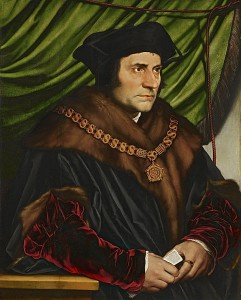 On this day in history, Tuesday 6th July 1535, Henry VIII’s former friend and Lord Chancellor, Sir Thomas More, was beheaded on Tower Hill as a traitor.
On this day in history, Tuesday 6th July 1535, Henry VIII’s former friend and Lord Chancellor, Sir Thomas More, was beheaded on Tower Hill as a traitor.
More had been found guilty of high treason under the Treason Act of 1534 for denying the king’s supremacy and refusing to take the Oath of Succession.
Trivia: Sir Thomas More had once said of Henry VIII “if my head would win him a castle in France, it should not fail to go”.
Also on this day in history, 6th July 1553, King Edward VI, son of Henry VIII, died at Greenwich Palace. The throne was passed to Lady Jane Grey, daughter of Edward’s cousin, Frances Brandon, but she reigned for just thirteen days, until 19th July when Mary I took the throne and imprisoned Jane.